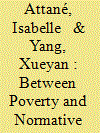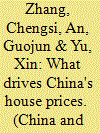| Srl | Item |
| 1 |
ID:
162088


|
|
|
|
|
| Summary/Abstract |
This article is based on data from a study undertaken in 2014-2015 in rural southern Shaanxi to analyse the relationship between bachelors who have not chosen to be single and their satisfaction with life. Its aims are twofold: firstly, to explain the differences in the quality of life between married and single men by means of conventional variables (socio-economic profile, state of health, intensity of social relations); secondly, to explore quality of life factors associated with relations these men have with women and which, to our knowledge, have never hitherto been taken into account in analyses of inequalities in life satisfaction in China. In particular, we attempt to see the extent to which inability to contract a marriage is likely to affect quality of life, especially through the social injunction to marry and the social stigmatisation attached to bachelorhood, while at the same time exploring how quality of life varies in relation to the frequency of intimate relations with partners in a context where sex remains socially associated with marriage. In this way, we bring to light individual and contextual features that can be considered to contribute to the growth of inequality in life satisfaction resulting from socio-economic circumstances.
|
|
|
|
|
|
|
|
|
|
|
|
|
|
|
|
| 2 |
ID:
152115


|
|
|
|
|
| Summary/Abstract |
This article investigates whether gender imbalance may be conducive to domestic terrorism in developing countries. A female-dominated society may not provide sufficient administration, law, or order to limit domestic terrorism, especially since societies in developing countries primarily turn to males for administration, policing, and paramilitary forces. Other economic considerations support female imbalance resulting in grievance-generated terrorism. Because male dominance may also be linked to terrorism, empirical tests are ultimately needed to support our prediction. Based on panel data for 128 developing countries for 1975 to 2011, we find that female gender imbalance results in more total and domestic terrorist attacks. This female gender imbalance does not affect transnational terrorism in developing countries or domestic and transnational terrorism in developed countries. Further tests show that gender imbalance affects terrorism only when bureaucratic institutions are weak. Many robustness tests support our results.
|
|
|
|
|
|
|
|
|
|
|
|
|
|
|
|
| 3 |
ID:
113691


|
|
|
|
|
| Publication |
2012.
|
| Summary/Abstract |
The high and rising house prices in China are not adequately accounted for the traditional explanations emphasizing demand-driven or cost-push factors. Recent published studies claim that gender imbalance increases competition among men in the marriage market, which has pushed Chinese, especially parents with a son, to buy houses as a signal of relative status in the marriage market; this marriage competition then causes high demand for houses and eventually leads to rising house prices in China. Empirical results in this paper, however, provide little support for this hypothesis and we find that a rise in the sex ratios for most age cohorts accounts for very small percentage variations in house price movements in China during 1998-2009. Further investigation suggests that excess demand driven by high monetary growth was a significant cause of the rising house prices in China during 1998-2009. Therefore, the impact of gender imbalance on house prices should not be exaggerated and monetary dynamics remains an important leading indicator for house price movements in China.
|
|
|
|
|
|
|
|
|
|
|
|
|
|
|
|